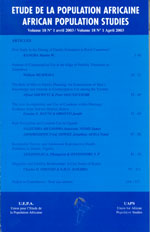
|
African Population Studies
Union for African Population Studies
ISSN: 0850-5780
Vol. 27, No. 2, 2013, pp. 188-202
|
 Bioline Code: ep13017
Bioline Code: ep13017
Full paper language: English
Document type: Research Article
Document available free of charge
|
|
|
African Population Studies, Vol. 27, No. 2, 2013, pp. 188-202
| fr |
Avogo, Winfred A.
Résumé
Cette étude utilise des données du sud du Ghana à examiner si l'augumentation du capital social grâce à la participation de groupes importent pour l'état de santé autoévalué. Empruntant du capital social, l'influence de l'appui social, du contrôle social informel, de la participation directe à la reproduction et des discussions de la santé des associations bénévoles de l'état de santé autoévalué et les rapports des maladies au cours des six dernieres mois précédent le sondage, font l'objet d'une enquête. Les rêsultats montrent que le soutien social et l'encouragement à utiliser la planification familiale sensiblement prédire mieux l'autoévaluation de la santé, tandis que le contrôle social informel et la participation directe ne fonctionne pas. En outre, il est détecté alors que le contrôle social est associé à la probabilitéé de déclarer des maladies au cours des six derniers mois; la participation directe aux groupes bénévoles a l'effet inverse. Enfin, les femmes avaient prédit mieux les probabilités inférieures de l'autoévaluation de la santé et les probabilités plus élévées des rapports des maladies dans le dernier six mois que les hommes. Les conclusions sont examinées dans le contexte du rôle nuancé du capital social à la santé et leurs implications en matière de promotion de la santé dans un contexte des resources limitées.
Mots Clés
Capital Social; les organismes communautaires; les associations de bénévoles; l'autoévaluation de la santé; l'Afrique subsaharienne
|
| |
| en |
Social capital, civic engagement, and self-rated health in Ghana
Avogo, Winfred A.
Abstract
This study uses data from southern Ghana to examine whether higher stocks of social capital through participation in civic groups matter for self-rated health. Drawing on social capital, the influence of social support, informal social control, direct participation in and reproductive health discussions within voluntary associations on self-rated health and reporting illnesses in the last six months prior to the survey are investigated. The findings show that social support and encouragement to use family planning significantly predict self-rated better health while informal social control and direct participation does not. Also, it is detected that while social control is associated with the likelihood of reporting illnesses within the last six months; direct participation in voluntary groups has the opposite effect. Lastly, women had lower predicted probabilities of self-rated better health and higher probabilities of reporting illnesses in the last six months than men. The findings are discussed in context of the nuanced role of social capital on health and their implications for health promotion programs in resource constrained settings.
Keywords
Social capital; community organizations; voluntary associations; self-rated health; sub-Saharan Africa
|
| |
© African Population Studies
Alternative site location: http://www.uaps-uepa.org
|
|
